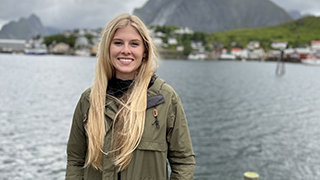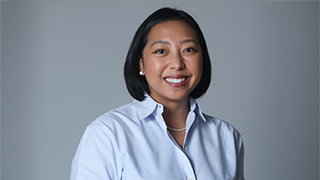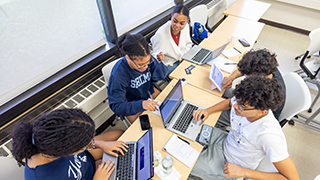Meet the New Fellows of the Center for Peace and Conflict Studies - Seton Hall University
Wednesday, February 9, 2022
Throughout 2021, the Center for Peace and Conflict Studies (CPCS) continued to work globally to reduce violent conflict. The Asia Pacific and US-China Relations Programme organized a series of online conferences on improving understanding and cooperation between the U.S. and China and bringing together leading scholars and former officials from the two sides.
The learning from this process is being compiled into a book co-authored by the participants. The Center's Middle East and North Africa (MENA) team supported peacebuilding through economic development in Yemen and heath cooperation in Libya. The reputation of the MENA team is demonstrated by its facilitation of the UN-Germany-led donor coordination process on the humanitarian-development-peace nexus in Yemen. The Center also expanded its Training and Mentoring to governments, multilateral institutions, and civil society. They signed new agreements to support the conflict sensitivity of Swiss foreign aid across the MENA region, with a particular focus on education and water aid during the Lebanon crisis, to conduct conflict analyses in support of German development assistance in Libya and Yemen, and to assist UNDP in drafting a regional conflict prevention strategy in the Middle East. An important part of their work has also been pro-bono advisory support to civil society organizations in Syria and Yemen. CPCS continued its contribution to global learning on best practices in peace and conflict, starting a new initiative on Ethical Political Commemoration and continuing its partnership with CSS ETH Zurich and British Colombia on how to Mediate Worldview Conflicts. Finally, the Center's team produced an impressive array of publications in top journals in the field, penned media articles for a wider audience, and convened speaker events on issues ranging from Women, Peace, and Security to political polarization in the United States.
All of this work was conducted by a mixed team of experienced peace academics and promising graduate students. The Center's work provides a unique opportunity to students for hands-on learning in managing peace projects. Indeed, two of their recent graduates – Maria Teresa Gonzalez Esquivel and Sushant Naidu – undertook a field mission to Amman to establish a partnership with the University of Jordan and kick start the economy and peace project in Yemen. The Center is very proud of their young graduate team's work, which has also helped them further their careers beyond the School. In 2021, Hussein Ibrahim (their first full-time project officer) joined Ideas Beyond Borders as its MENA Region Director, and Pallavi Shahi joined SaveLIFE Foundation as Senior Manager.
CPCS also welcomed its inaugural cadre of Senior and Nonresidential Fellows. The Senior Fellows are collaborating with the Center on specific initiatives. Rajaa Altalli, who will serve as the School's Sergio Vieira de Mello Endowed Visiting Chair in 2022, is establishing a program on women peacemakers at the Center. Tatsushi Arai (a Visiting Chair in 2019) is a leading voice in the learning process on worldview conflicts and served as a United Nations Senior Mediation Advisor. Hans Gutbrod established the Center's ethical, political commemoration initiative. Joseph Huddleston, a professor at the School of Diplomacy, provides ongoing support for the economy and peace program Yemen. The Nonresidential Fellows bring significant knowledge and networks to CPCS, including in international diplomacy, community peacebuilding, strategic communications, negotiation, and mediation. They all have connections to the Center and the School of Diplomacy. Three of them, Vance Crowe (M.A.' 10), Chandra DeNap Whetstine (M.A.'10), and Brandon Kotlow (M.A.' 16), are School of Diplomacy alumni. Andrew Cheatham has worked with the team on a project focused on Iraq, and Hussein Ibrahim has continued to support the team via offering Iraqi local and national contexts for conflict sensitivity programming and training.
Meet the New Fellows
Senior Fellows:
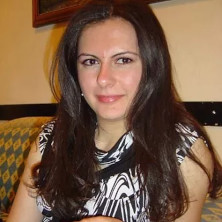
Co founder of Center for Civil Society and Democracy for Syria
"In March 2011, I co-founded the Center for Civil Society and Democracy (CCSD) to
support and strengthen Syrian civil society, to promote the transition to democracy
in Syria. To accomplish these objectives, we supported women and civil society members
to meaningfully participate in the peace process in Syria and also in resolving conflicts
in their local communities. Through CCSD, we led many successful interventions and
initiatives to release detainees, negotiate ceasefires, promote diverse identities
through cultural activities, negotiate humanitarian access, and other important interventions.
In terms of my peacebuilding work in Syria, the security challenge continues to be
the biggest challenge. For example, the likelihood of the threat of detention and
torture by the Syrian government for civil society activists and for political activists
is very high. Sustainable peace requires setting in place a truthful justice mechanism.
Justice requires the political will to achieve peace. Inclusive Dialogue Forums is
one vital tool to engage more civilians in building sustainable peace, reconciliation,
and justice. The collaboration with the CPCS will involve transferring the knowledge
and the practice of building peace in Syria to the region of the Middle East and beyond,
mainly in the Women, Peace, and Security field."
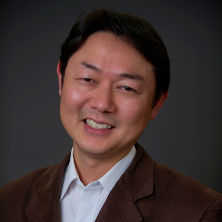
Associate Professor of Peace and Conflict Studies at Ket State University, Ohio
"My work essentially focuses on understanding the systemic roots of violent conflict
and building sustained efforts, initiatives, and processes to manage and transform
them. During the past decade, I have devoted much of my time and effort to peacebuilding
training, training of trainers, facilitation of conflict resolution dialogues, and
development of networks and platforms in conflict-affected societies in Asia, sub-Saharan
Africa, and the Middle East. Establishing a peacebuilding initiative in the midst
of conflict is very difficult. Yet what is far more difficult is to sustain the initiative
for a long time. Many of us in the field are familiar with initiating something important
for peace. But few of us are trained and experienced in sustaining peacebuilding efforts
over decades and generations. And yet, a truly significant social change can take
place only when we stay committed for a very long time. I view the Center as a dynamic
hub and an expanding forum of exchange where different scholars, practitioners, and
students can get together and generate something meaningful for a shared cause of
peacebuilding. I look forward to developing a shared vision with others through dialogue,
reflection, and learning while sharing my research on mediative practice, in which
I define organized activities that provide mediating social functions in conflict-affected
settings where there is no formally designated mediator taking the lead in conflict
resolution."
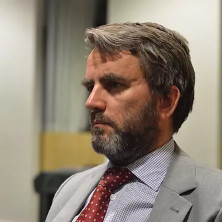
Associate Professor at Ilia State University in Tbilisi, Georgia
"My main focus at CPCS will be an Ethics of Political Commemoration. We want to develop
a framework that allows commemoration to be constructive and to exit circular loops
of remembering. In a way, this approach can bring history back under control and highlight
that what we make of the past is up to us, especially in our relationship with others.
This directly matters to peace and conflict since distrust and unwillingness to engage
often rely on a narrow way of seeing past events. One great challenge can be how to
approach vexing questions of the past. People often are overwhelmed and do not know
which direction to take. A great example of that is the Stalin Museum in Georgia (in
the Caucasus). Recently, the Georgian government put together a commission to figure
out how to deal with this murderous legacy, still venerated by many. With the Ethics
of Political Commemoration, we are trying to give a sensible direction to efforts
of commemoration. In the coming months, I hope to engage with the Center by collaborating
with colleagues, developing the concept further, testing its application, and engaging
with various audiences, including students, to see what we can learn from each other,
and hopefully also attract some partners to work with the Center, on this issue."
Joseph Huddleston, Ph.D.
Assistant Professor at the School of Diplomacy and International Relations, Seton
Hall University, new Jersey
"My research focuses on diplomacy by nonstate actors in the conflict, as well as on
the economic consequences of protracted social conflict. From the peacebuilding perspective,
successful diplomacy provides alternatives to a violent confrontation, serving as
the catalyst of peace and ceasefire agreements that have historically drawn ends to
horrific bloodshed. Yet it can also drastically worsen the conflict, inviting arms
and actors to flow and weakening chances for a peaceful resolution, or else freezing
the conflict in states of irresolution. Much of our knowledge about diplomacy war
focuses on the state, so understanding the role diplomacy plays for key nonstate actors
is crucial for identifying pathways towards peace. The biggest lesson I have drawn
from my work on both diplomacy and war economies is that for many parties in conflict,
perceptions of those who have legitimacy are a key determinant of the trajectory of
the conflict. Legitimacy is the unclear, ethereal factor in governance and politics,
and yet despite its abstractness, it translates directly into concrete outcomes: negotiation
of ceasefires, humanitarian aid networks, and power-sharing agreements. I look forward
to continuing to work with the Center on studying the effects of protracted conflict
on vulnerable people caught in the crossfire, as well as unexpected actors of influence
who can help forge new paths to peaceful change."
Nonresidential Fellows:
Andrew Cheatham
Senior Advisor to the President and SEO of the United States Institute of Peace (USIP)
"My work as an advisor to the President and CEO of the United States Institute of
Peace (USIP) seeks to help all parts of the organization to promote four key objectives:
First, mitigating the potential for violent conflict created by strategic rivalry
among major world powers. Second, reducing violence, extremism, and fragility in countries
central to U.S. interests. Third, reducing the potential for violent conflict from
global shocks by helping to identify, establish, and field-test mechanisms that will
help fragile states and societies manage coming disruptions. Fourth, promoting U.S.
peacebuilding norms and values, including social justice and rules-based engagement.
I believe the biggest lesson for peacebuilding is that multilateralism works. This
is evidenced by the relative peace and prosperity humanity has witnessed since the
creation and promotion of major international and regional organizations since World
War II. That said, international norms and legal frameworks need to be revised along
with the much-needed reform of multilateral institutions. The current organizations
were not fit for purpose in 2021. New global problems like exponential technological
advances in the information space (media), biotech, financial transactions, monetary
instruments, logistics, and of course, warfare require an updated unified intergovernmental
effort. Of course, other unforeseen global shocks from climate change and pandemics
also require new types of collective action."
Vance Crowe '10
CEO of Articulate Ventures, Saint Louis, Missouri
"As the CEO of Articulate Ventures, a strategic marketing firm, I have found myself
advising farmer organizations that feel deeply misunderstood and alienated by the
urban populations. These farmers feel as though the majority population wrongly believes
they are mistreating animals, using chemicals irresponsibly, and that they should
not have the freedom to raise their agricultural products. This is a challenging situation
because these rural and urban groups represent radically different cultures and yet
are governed by the same system. They are intertwined as networks, and yet they feel
driven apart. I look forward to collaborating with the Center for new ideas and perspectives
on how to bring these wary groups together as these cultural differences are likely
to increase in tension during these uncertain times."
Chandra DeNap Whetstine '10
Vice President of Programs and Operations at the One America Movement
"One America Movement's work addresses the symptoms and drivers of America's division
in order to arrest the cycle of toxic polarization that can lead to irrevocable divisions
and even violence. The biggest challenge of this work (and the most important thing
to learn!) is that it moves at the speed of trust and relationships. We can't bring
people together across divides without first building trust, which is long, slow work.
It begins when groups and their leaders examine the norms and behaviors that are acceptable
within their communities and can only then lead to meaningful engagement across divides.
In partnering with the Center for Peace and Conflict Studies, I hope to leverage One
America Movement's approach to support CPCS expansion towards working on domestic
issues, and I hope to learn from the work of CPCS abroad."
Hussein Ibrahim
Regional Director, Ideas Beyond Borders, Iraq
"My work focuses on increasing peacebuilding literature through online content translation
from English to Arabic. Also, we empower undergraduate students by giving them training
courses on translation, online editing articles, media literacy, and critical thinking.
We then give them practical opportunities to transform their theoretical learning
into practice. Altogether, we hope to expand access to peacebuilding knowledge and
skills so that they can be leveraged by future developing leaders. The biggest challenge
in the communities we work in (at local government levels) is the lack of awareness
on peace dividends. As a result, I envision collaborating with the Center on projects
that one, connect youths to local government and civil societies in their communities,
and two, empower future leaders in their work to build peace more sustainably in ways
that are sensitive to the conflicts that may surround them."
Brandon Kotlow '16
Program Officer, Strategic Capacity Group (SCG), Virginia
"The institution-building projects that I support enhance the strategic capacity of
the Ministries of Interior, Public Security, and Defense and operational and combatant
commands to improve the sustainability and impact of modernization and reform programs.
We provide guidance to address policy and implementation gaps, assess institution-building
needs and design, implement capacity-building support to meet those identified needs,
and advise on best practices to institutionalize enhanced processes and procedures
to meet the recipient institution's mission and goals. I find that sustainability
is one of the major challenges to foreign assistance and that two essential components
are often missing. First, all efforts must have local ownership. Second, project activities
should be flexible to adapt to local constraints. As a former M.A. graduate of the
School of Diplomacy and International Relations, I recognized that there is room for
improvement in preparing students with the practical skills that will help them enter
the workforce. This is an area that I hope to collaborate with the Center for Peace
and Conflict Studies on as a Nonresidential Fellow, in addition to providing career
path advice for current and former students and supporting the Center in other areas."
Categories: Nation and World




